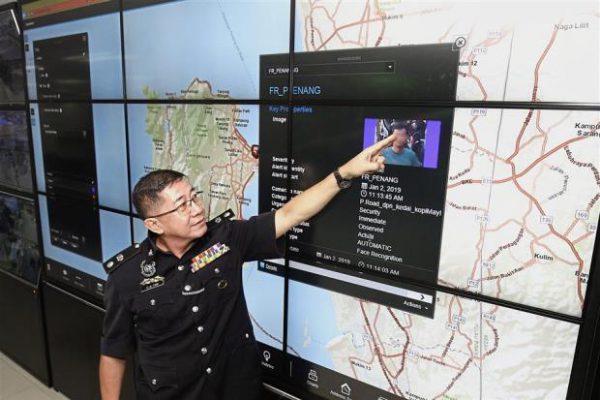Penang launches facial recognition system to identify criminals
Penang has become the first state in Malaysia to launch a facial recognition system capable of detecting faces of criminals through closed-circuit television (CCTV) cameras, in a bid to improve public safety in the state. Chief Minister Chow Kon Yeow said the technology which uses artificial intelligence developed by IBM would enhance the 767 CCTVs installed by the Penang City Council (MBPP). The installation of CCTVs since 2008 with the cooperation of the police involved a cost of RM46.2 million, while the current project involved an allocation of RM12 million, including the installation of another 150 CCTVs, and is expected to be completed by May this year. The police would upload the image of a criminal or wanted person to the system and if it managed to track similar faces through any of MBPP’s CCTVs, the local authorities would alert the police immediately. (The Sun Daily)
Dr M: Malaysia may resume ECRL project, but on smaller scale
The East Coast Rail Link (ECRL) project, which was suspended last July, could resume on a smaller scale if China agrees to the move, said Prime Minister Tun Dr Mahathir Mohamad. “What we are trying to do is to ensure that we will not spend much money while China will not suffer a loss,” he was quoted as saying. Malaysia is in a dilemma between terminating the project or continuing with it, with either option entailing huge financial costs, he said. The RM81bil ECRL project was approved by Cabinet under then-Premier Datuk Seri Najib Tun Razak in October 2016. The 688km rail link, if built, would connect Port Klang in Selangor with Pengkalan Kubor in Kelantan and would be constructed in two phases. (The Star Online)
High-rise residential market to remain soft
The high-rise residential market sampled in Kuala Lumpur and Selangor remained soft overall in 3Q2018 and this is expected to persist early next year. Savills Malaysia does not expect an immediate upswing of activity and pricing, said its director of research and consultancy Amy Wong. “The lack of secondary market transactions for high-rise residential properties during 9M2018 is believed to be due to lingering uncertain sentiments among investors and buyers as well as concern about the possible drastic changes in terms of government policies after the change in the political landscape,” she said. Overall, the prospects for the high-rise residential market in KL remains soft, especially in the secondary and the high-end segments. Prices are expected to maintain at their current levels due to the cautious market, large impending supply in the coming years, and lack of incentives to purchase in the secondary market, she adds. (The Edge Markets)
Smart city agenda on track
The priority for this year will be to transform Penang into a smart city which is in line with Penang 2030 ‘A Family-Focused Green and Smart State’. State Housing, Town, Country Planning and Local Government Committee chairman Jagdeep Singh Deo said several pilot projects were in the pipeline for such purpose. He said the town and country planning agenda for Penang would also be carried out from now until 2030. He added that the property market in Penang was still strong despite reports of overhang units. Jagdeep said Penang had 3,261 overhang residential units last year compared with 2,271 units in 2017, adding that the figures were relatively low compared to Johor and Selangor. (The Star Online)
Hong Kong’s $64bil plan to build islands for new homes
Hong Kong, the world’s least affordable property market, has a plan to tackle its housing crisis: build four artificial islands equal to about a fifth the size of Manhattan that could house more than a million people. The government-backed plan to create a gleaming property and commercial hub has been tried before – Palm Jumeirah in Dubai, Forest City in Malaysia, and Jurong in Singapore. Yet building artificial islands in Hong Kong has a number of vexing complications, starting with the price tag. It’ll cost at least an eye-popping $500 billion HKD ($63.8 billion), and the tab could double. There is also opposition from the public, as well as massive environmental costs. Hong Kong Chief Executive Carrie Lam pitched the plan—called the Lantau Tomorrow Vision—as part of her annual policy address last year. The plan for 1,700 hectare (4,201 acres) islands in the city’s central waters, between Lantau Island and Hong Kong Island, would be slated to add up to 400,000 housing units for an estimated 1.1 million people starting in 2032. (Bloomberg)





